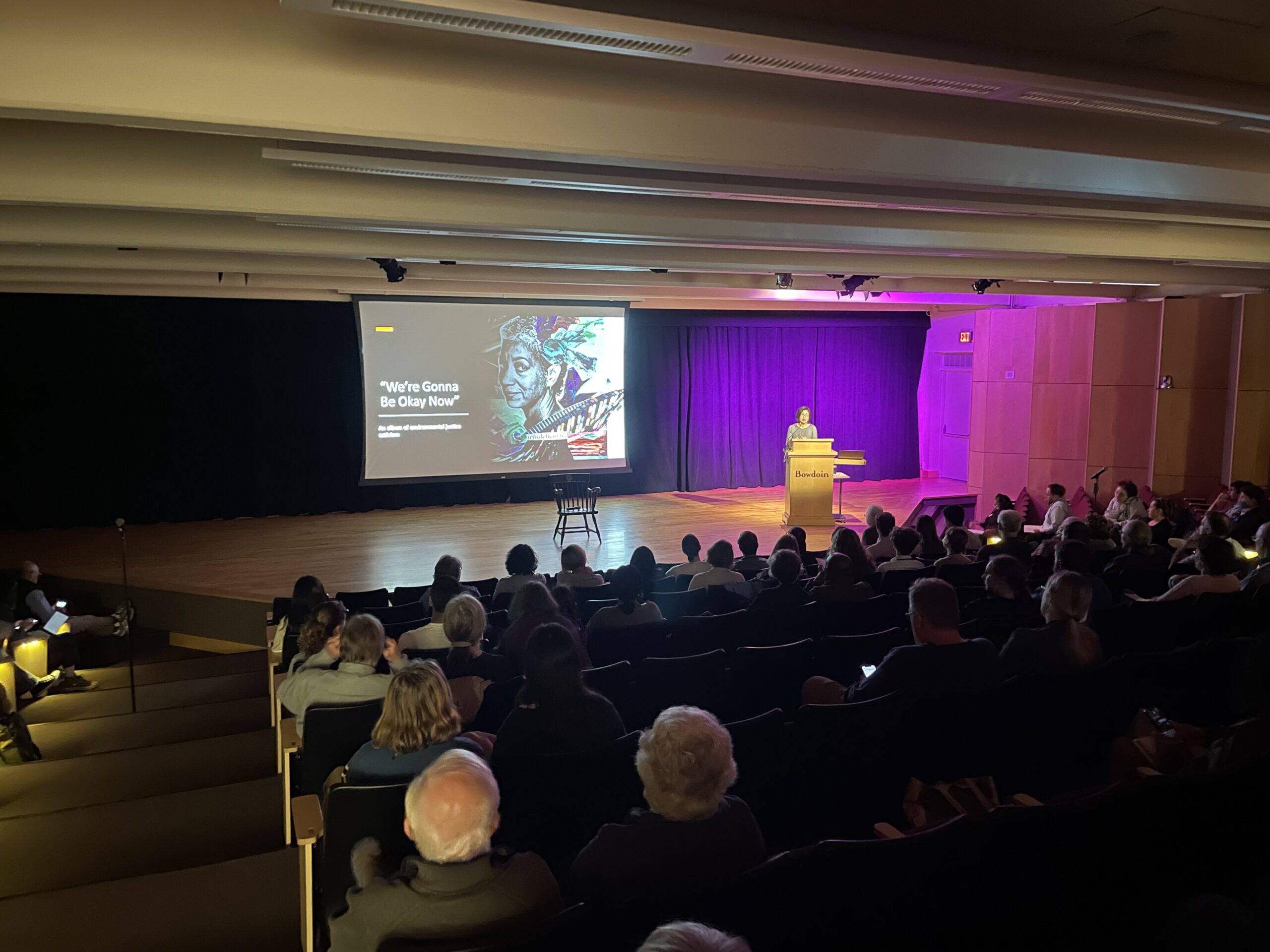Williams ’12 delivers environmental studies keynote address
April 14, 2023
 Alex Washburn
Alex WashburnLast night, Teona Williams ’12, environmental activist and current presidential postdoctoral fellow in the geography department at Rutgers University, gave the keynote address to commemorate 50 years of Environmental Studies (ES) at the College.
An environmental studies-history coordinate major and Africana studies minor, Williams returned to Bowdoin in Kresge Auditorium to speak about her interdisciplinary approach to her work and teaching at the intersection of environmental and racial justice.
Her talk, entitled “‘We’re Gonna Be Okay Now:’ Lessons Learned from a Bowdoin Environmental Studies Alumna,” charted her path to radical environmental activism and scholarship, the early inspiration for which arose in her courses at Bowdoin.
Born and raised in southeastern Washington D.C., a predominantly-Black and low-income neighborhood bordering the Anacostia River, Williams became aware of the intersecting struggles for environmental and racial justice at an early age.
“I found myself growing up in a community where the nearest park took two buses to get to, the nearest full-line grocery store was a 60-minute bus ride away and where the air smelled of sewage due to the neighboring wastewater facilities that dotted my neighborhood,” Williams said.
Williams described that it wasn’t until her arrival at Bowdoin that she realized how studying the environment can be applied to affect social change.
“In my first environmental studies intro course, I learned about climate change for the first time, and I immediately thought about the impact it would have on my community back in Southeast, [Washington, D.C.],” Williams said. “Through the environmental humanities here, I saw the roots of the environmental justice movement as a coalition of everyday people from communities just like mine.”
This conceptualization of environmental justice as a Black-led, community-driven effort was solidified in one of her early research experiences.
As a Mellon Mays Fellow, Williams spent the summer of 2010 at the University of Chicago, where she conducted research on national parks. However, most of her learning occurred outside of the classroom.
“I witnessed neighborhoods surrounded by waste plants, but I also witnessed Southside residents fighting for equitable revitalization.… I saw a community and struggle not unlike my neighborhood in Southeast, [Washington, D.C.],” Williams said.
Seeing environmental justice as community-centric has inspired Williams’ research over the past several years, which focuses on Black feminist environmental activism.
Williams spoke about one of the most formative experiences in her research: her own on-the-ground activism in Flint, Mich., while studying for her master’s in environmental justice at the University of Michigan at Ann Arbor.
While going door-to-door to conduct research on the impacts of the water crisis in Flint neighborhoods, Williams realized that her studies had to be coupled with grassroots organizing.
“The data meant nothing if at the end of the day, scholars like myself went home and drank the tap water when my comrades in Flint could not. People are not data, they are people. I knew that I needed to pivot to make sure those politics were front and center,” Williams said. “I ended up pivoting my labors to partner alongside ‘Communities First,’ a very small nonprofit working on housing and food insecurity [in Flint].”
In 2021, Williams found herself in the middle of another environmental crisis in Jackson, Miss., when winter storms left residents without water for weeks.
Williams was inspired by the actions of her community members who organized mutual aid projects to provide relief to those experiencing the worst of the storm.
“Black feminists in Jackson quickly rallied to ensure the survival of their communities,” she said. “They knew that no one was coming for us but us, and it was through these mutual aid projects that I learned about how black feminism is its own form of weatherization.”
Williams ended her talk by prompting audience members to consider the legacy they want to leave and the change they want to inspire in the next 50 years of environmental studies at Bowdoin.
“I ask myself these same questions,” she said. “How do I, a Black woman, first-generation college student, reconcile my deep commitment to environmental studies with the very communities I’m also accountable to? How do I claim ES as my home but make it my radical home?”
Katie Kurtz ’24, an environmental studies-Italian coordinate major, attended the talk and was inspired by the intersectionality of Williams’ work.
“[Williams] eloquently put the transition that the environmental studies field needs to consider as we move into the next 50 years,” Kurtz said. “[Williams is] expanding our definition of [the] environment beyond just something that’s green and growing.”

Comments
Before submitting a comment, please review our comment policy. Some key points from the policy: